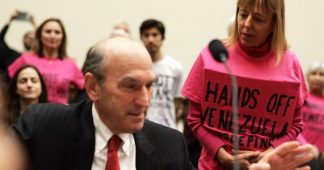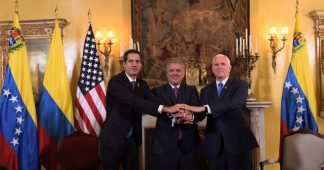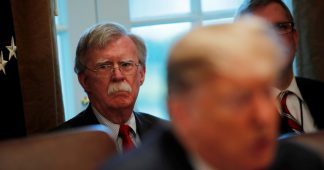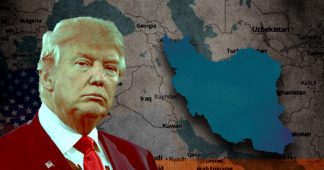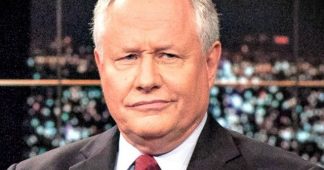Hawks seek revival with new group
The ‘Vandenberg Coalition’ appears to be picking up where two previous defunct neocon outfits left off.
Jim Lobe
April 30, 2021
Fresh from his great success at regime change as Donald Trump’s Special Envoy for both Venezuela and Iran, neoconservative hero Elliott Abrams took to the oped (some say comics) page of the Wall Street Journal to announce the creation of “A New Coalition to Advance U.S. Global Interests“ dedicated to the proposition that the United States must maintain its post-World War II role as “superpower leader of the free world” and “the most powerful and influential nation in the world.”
Called the “Vandenberg Coalition” in honor of the Republican chairman of the Senate Foreign Relations Committee who provided critical backing for President Truman’s Atlanticist and globalist agenda after World War II, this new coalition appears at first blush to be the latest reincarnation of the Project for the New American Century, a letterhead organization headed by Bill Kristol and Bob Kagan, that did so much to promote the U.S. invasion of Iraq in the immediate aftermath of 9/11. PNAC, which effectively died in 2006 as Iraq sunk into a vicious counter-insurgency and civil war, was succeeded in turn by the Foreign Policy Initiative in 2009 (initially to promote the “Surge” in Iraq) and persisted, if somewhat feebly, until 2017 and the advent of Donald Trump.
Unlike both PNAC and FPI, which included a few token Democrats, the 75 former foreign policymakers and analysts who have associated themselves with the new coalition appear to be Republican or non-partisan, although most identified as “Never Trumpers.” Indeed, Abrams’ appeal appears designed precisely to rally those sectors of the GOP that, however divided they were over Trump, “were never divided over the importance of American global leadership,” and against its supposed opposite — what neoconservatives like Abrams have long considered the greatest threat of all — “isolationism.”
In that respect, the group recalls the mid-1990s when neoconservatives and their aggressive nationalist allies, like Dick Cheney and John Bolton — and the defense contractors that backed them — fretted about what they called the rise of “isolationist” influence in the party. Indeed, that’s what prompted the creation of PNAC in 1997, one year after Kristol and Kagan published their founding manifesto in Foreign Affairs, “Towards a Neo-Reaganite Foreign Policy,” which, among other things, called on Washington to exercise a “benevolent global hegemony.” Compare PNAC’s founding principles, signed by Abrams, Cheney, Donald Rumsfeld, Paul Wolfowitz, Frank Gaffney, and Francis Fukuyama, among others, with those of the new coalition, and you’ll hear a distinct echo.
Indeed, overlap between Vandenberg’s boards of advisers and directors with PNAC’s and FPI’s many public letters is both remarkable and unsurprising. In addition to Abrams, who is Vandenberg’s chairman, Amb. Paula Dobriansky and China hawk Aaron Friedberg were among the two dozen founding members of PNAC and now work with him at Vandenberg. Eric Edelman, who served as number 3 in Cheney’s Pentagon, served as a director of FPI and now sits on the new coalition’s board. Juan Zarate, another former FPI chair, is signed up with Vandenberg, as is Randy Scheunemann, PNAC’s initial executive director who also headed the Committee for the Liberation of Iraq and served as Sarah Palin’s foreign policy adviser during the 2008 McCain presidential campaign. Many if not most of the individuals associated with the new coalition worked on the McCain and Romney campaigns.
The organizational overlap is even more striking. While neoconservative and ardently pro-Israel neoconservative “scholars” from the American Enterprise Institute, such as Richard Perle, Danielle Pletka, and Michael Ledeen, played a particularly dominant role alongside Kristol and Kagan in PNAC’s work, individuals from the Hudson Institute, the Foundation for Defense of Democracies, the Heritage Foundation, and the Hoover Institution, among other generally hawkish think tanks, also signed the group’s numerous public letters. In Vandenberg’s case, the organizational representation is more evenly balanced, with a still-important presence of AEI scholars, but bigger contingents from the pro-Likud FDD, Hudson, and Heritage. Analysts from the Washington Institute for Near East Policy, the Atlantic Council, as well as the Center for Strategic and International Studies and the Center for a New American Security, both of which receive substantial funding from defense contractors, are also well represented.
And while PNAC was far more focused on the Middle East, Vandenberg, like FPI, appears to have somewhat broader concerns, particularly related to China. In his oped Wednesday, Abrams asserted that “chief among [significant national-security threats faced by Washington] are revisionist powers, the spread of nuclear, chemical and biological weapons, and transnational terrorism and crime — all made more dangerous by renewed great-power competition with, and myriad threats posed by, the Chinese Communist Party.” Nonetheless, in keeping with its chairman’s strong neoconservative worldview, the articles currently featured in the “analysis” section of Vandenberg’s website, called “Honest Candor,” give disproportionate attention to Iran and Israel.
Speaking of “honest candor,” the phrase which Vandenberg himself used to describe his preferred approach to foreign policy debates, the choice of Abrams to lead the new organization is curious indeed. Convicted of lying to Congress during the Iran-Contra affair (and later pardoned by President George H.W. Bush), Abrams subsequently served in both the George W. Bush and Trump administrations in positions that did not require confirmation by the Senate, due to his well-deserved reputation for prevarication during the bloody Central American wars of the 1980s when he served as assistant secretary of state for human rights and then Inter-American Affairs.
As senior director for Near East and North African affairs from 2002 to 2009, Abrams played a key role in encouraging the U.S. invasion of Iraq and urging other interventions in the region and supported an armed coup attempt against the democratically elected Hamas government in Gaza, touching off a brief civil war that left the Islamist group stronger than ever. His advocacy as special envoy for Venezuela and Iran for ever-stronger sanctions against the governments in those two countries succeeded only in strengthening hard-line forces in both nations and pushing much of their middle classes into poverty. Given that record, why Vandenberg’s backers would choose him as the group’s chairman and public face, is intriguing, to say the least.
Also intriguing, however, are the names of former Republican policymakers and analysts who apparently chose not to join this latest effort to rally Republican interventionists against alleged isolationists. John Bolton, for example, would seem to be a natural for this outfit, as would Hudson’s I. Lewis “Scooter” Libby, or Wolfowitz, Eliot Cohen, and Fukuyama — all of whom signed PNAC’s original charter along with Abrams, Cheney, and Rumsfeld. And what happened to the original co-founders of both PNAC and FPI, Kristol and Kagan? Intriguing indeed.
Published at responsiblestatecraft.org

